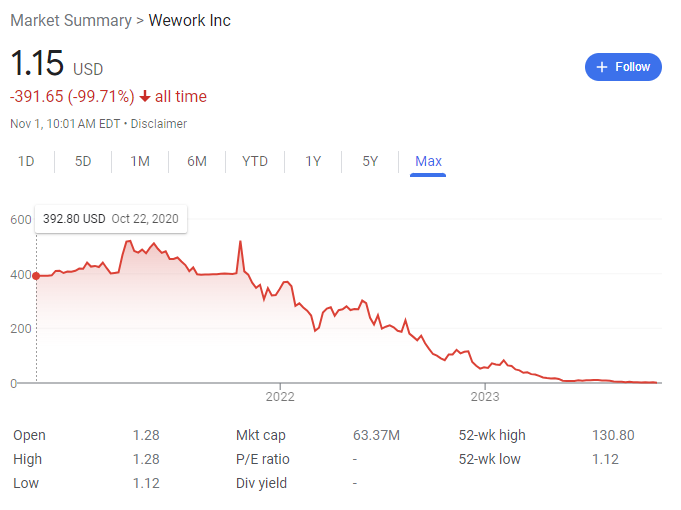Office space company WeWork saw its stock plummet to an all-time low following a report that it will file for bankruptcy as early as next week.
News that the startup, once valued at $47 billion, was considering a bankruptcy declaration hit the pages of the Wall Street Journal Tuesday afternoon. This follows a months-long struggle to pay its debts. In the Journal’s report, sources familiar with the matter said the New York-based company is planning to file a chapter 11 petition in New Jersey.
Welp, WeWork has officially filed for bankruptcy.
From a $47 billion private market valuation to a $9 billion IPO via a SPAC in 2021, and now trading at $1.32 a share in after hours, marking a jaw-dropping 99% drop from its IPO price.
The co-working space drama continues to… pic.twitter.com/rv7zvQy0Cn
— Michael Burry Stock Tracker ♟ (@burrytracker) October 31, 2023
Learn the benefits of becoming a Valuetainment Member and subscribe today!
Valuetainment previously reported on WeWork’s failure to makes $95 million worth of interest payments due on five bonds in September 2023, triggering a 30-day grace period before a default would occur.
In early October, WeWork claimed it had enough money to make payments and suggested it might do so during the grace period. It seems the company went with its other option, which was to preserve cash for negotiations with creditors. At the time, it had plans to raise more money by issuing debt or equity securities.
Yesterday, the company said it reached an agreement with its bondholders to be given another seven days before default.
While WeWork has not officially declared bankruptcy, its shareholders have responded as if it is a done deal. Following the news, WeWork stock plummeted to an all-time low Wednesday morning.

In August, WeWork said it was in the process of renegotiating almost all of its real estate leases with landlords. It also stated there was “substantial doubt” it could meet all its operations costs. In response, its shares dropped by more than 25 percent.
At that time, WeWork shook out three board directors and replaced them with four new ones with experience in large financial restructurings.
Watch Tom “the Biz Doc” Ellsworth’s case study on WeWork below:


















Add comment